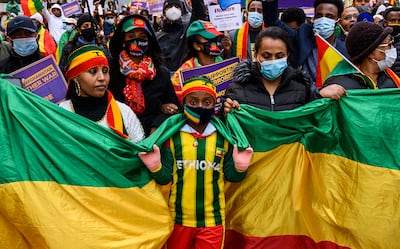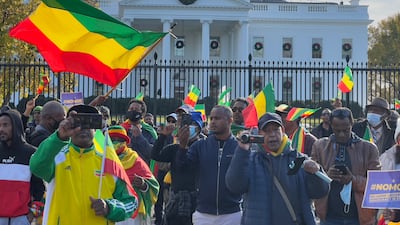From restaurants and music to advancements in medicine, business and the arts, the Ethiopian community – the largest African population in the country – has had a significant impact on the US. During this year's presidential elections, the community, which has traditionally aligned with the Democratic Party, appeared to shift to the right.
“A majority of Ethiopian Americans associated with the Democratic Party for many years,” Mesfin Tegenu, chairman of the American Ethiopian Public Affairs Committee, told The National. “Although we haven’t conducted a formal survey, it looks like there has been a shift in party affiliation or support. We believe a significant number might have moved to the Republican Party.”
He pointed out that the trend started in the 2022 elections, when the community - in the Washington area in particular - “started to rethink its strategy”, highlighting the perception that a devastating conflict in eastern Ethiopia was being ignored by President Joe Biden's administration.
The conflict between the Tigray People's Liberation Front and Ethiopian central government forces, which included regional militias and troops from neighbouring Eritrea, killed hundreds of thousands and forced more than two million from their homes amid reports of abuses by all parties. The Pretoria Agreement, signed on November 2, 2022, ended hostilities between the Ethiopian government and the TPLF.
The Tigray conflict is only the most recent upheaval Ethiopia has experienced. In 1974, police and military protests broke out against the government of Emperor Haile Selassie. Six years later, President Ronald Reagan granted amnesty to Ethiopians following a wave of migration to the US, which encouraged further migration into the 1990s.
Princess Gelila Mariam Selassie, a prominent member of the Ethiopian diaspora, was one of those whose family made the journey to the US.
“The reason why I came to this country is my father. Both my parents were very close to the court,” the former wife of Prince Ermias Sahle Selassie, grandson of Haile Selassie and President of the Crown Council of Ethiopia, told The National. “My father was a Supreme Court judge under His Majesty's administration. In 1974, when the revolution happened, he was detained by the communist government, and our childhood turned completely upside down.”

She explained that the community's shift to the Republican Party stems from hopes that Donald Trump will change US policy on Africa in general but especially the Pretoria Agreement.
“The last four years, the policy didn’t work. You know, Special Representative [to the Horn of Africa] Mark Hammer has been in the region several times, 10 times, 20 times. But it didn’t change anything in the Pretoria Agreement,” she said. "They [the community] are very disappointed with the Democrats’ foreign policy."
Princess Gelila, who says she is still referred to her by her title in the community despite no longer being a member of the royal family, added that Ethiopians in the US “have common concerns, but the majority were supporting conservative values, so they went for Donald Trump”.
So-called culture war issues, such as same-sex marriage and trans rights, pushed many in the community – a large portion of whom are Christian or Muslim – into the conservative camp.
She also pointed out that the Ethiopian community has been greatly affected by the economic issues all Americans are struggling with, including inflation, housing affordability and job security. In addition, some believe the Biden administration supported dictators and provided unrestricted loans through the International Monetary Fund and World Bank.
“We do have a lot of unemployment issues. We do have a lot of social issues. We do have a lot of cultural barriers. We have a shortage of Ethiopian community centres where we can solve our problems and work with larger institutions on housing and education,” she said.
Sylvie Bello, chief executive of the Cameroon American Council and a member of the executive committee of the DC Language Access Committee, noted that the Biden administration approved Temporary Protected Status (TPS) for Ethiopia in 2022, but its expiration at the end of next year raises questions about what will happen next, especially with the backlog of asylum cases.
Mr Biden has been blamed by Mr Trump and Republicans for allowing migrants to flood over the southern US border to claim asylum, increasing this backlog.
In the face of such concerns, Ms Bello emphasised the importance of immigration relief and language access for African immigrant communities. “I feel like their hopes mirror all of our hopes as African immigrants. Talking and working with Ethiopians, I find that immigration relief is a big deal. I find that language access is also important, especially since some African languages are mostly spoken but not written.”
TPS allows people from qualified countries that are witnessing armed conflict, natural disasters or other “extraordinary and temporary” conditions to stay in the US and apply for work permits.
As the prospect of the end of TPS looms, Mr Mesfin expressed concerns about possible attacks on civilians and infrastructure in Ethiopia.
“The country has no law and order. There is an absolute one-man dictatorship, and it’s really a huge concern for all of us here,” he said. "We hope and pray that this will reverse."

